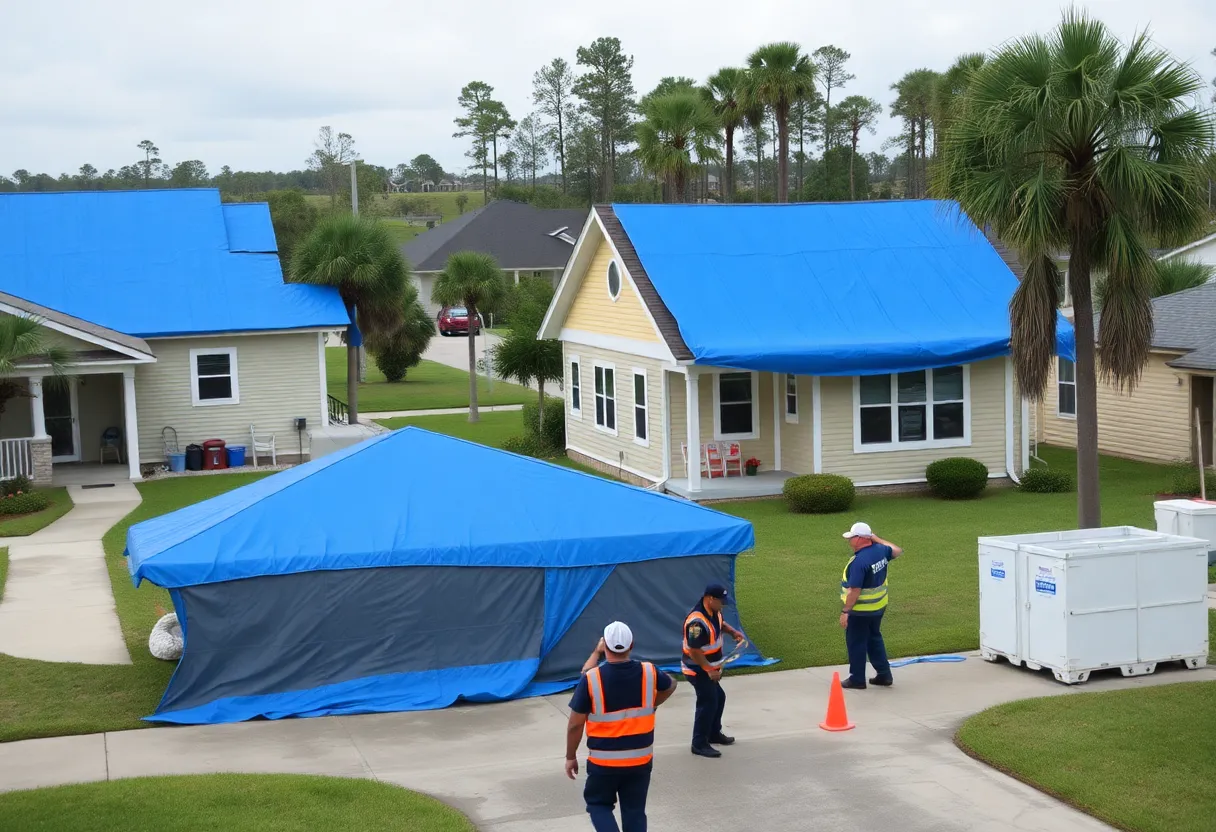News Summary
As the Atlantic hurricane season approaches, Louisiana is grappling with uncertainty around federal emergency management support. Recent changes in FEMA’s leadership and potential funding cuts are raising concerns among state officials and residents. Following Hurricane Ida, which caused significant damage, many homes remain unrepaired. Local leaders urge the continuation of robust disaster support as the state prepares for possible future storms. Governor Jeff Landry reassures that he does not anticipate significant funding cuts but warns that any reductions could hinder effective disaster response.
Galliano, Louisiana
As the Atlantic hurricane season approaches, Louisiana faces growing uncertainty surrounding federal emergency management support. Recent leadership changes at the Federal Emergency Management Agency (FEMA) and potential funding cuts have raised alarms among state officials and residents preparing for the storm season that runs from June to November.
Hurricane Ida wreaked havoc on Louisiana just six weeks prior, inflicting severe damage across the region. Many homes, like Paula Bermudez’s in Galliano, remain covered with blue tarps, illustrating the ongoing struggle for recovery. The state has experienced six hurricanes categorized as three or higher since 2005, highlighting the pressing need for effective disaster management and recovery.
Louisiana has consistently received the largest share of FEMA direct assistance compared to other states, amounting to $53 million through the Individuals and Households Program from 2015 to 2024. This federal funding is particularly vital for cities like New Orleans, which rely heavily on these resources for post-disaster recovery. Concerns have escalated following the removal of FEMA administrator Cameron Hamilton after he voiced opposition to dismantling the agency. David Richardson has been appointed as the acting head of FEMA.
The possibility of FEMA’s elimination has triggered apprehension among Louisiana lawmakers and residents. A draft bill in Baton Rouge seeks to transform FEMA into a state-managed entity, stirring debate about how disaster recovery should be handled. Local leaders, including Parish President Cynthia Lee Sheng, stress the importance of maintaining robust disaster response systems despite existing flaws.
Specific projects, such as the FEMA-funded Resilient Algiers Project in New Orleans, are also at risk. This initiative was designed to turn vacant lots into an urban farm and stormwater management space, but it lost $1.2 million when the Building Resilient Infrastructure and Communities program was ended. The city’s Hazard Mitigation Office has raised concerns about securing future funding for similar projects critical for community resilience.
Amidst these challenges, Governor Jeff Landry has reassured constituents that he does not expect significant funding cuts this hurricane season. He has emphasized the need for preparedness, urging citizens to create evacuation plans and safeguard important documents in anticipation of potential disasters. However, experts are warning that any cuts to FEMA funding could leave Louisiana without the necessary resources to support effective emergency management.
Public opinion seems to favor increased federal assistance, with residents calling for more robust support from FEMA in disaster recovery situations. As the National Hurricane Center gets ready to issue regular tropical outlooks, the pressure is mounting for leaders to address these uncertainties in emergency support.
FEMA’s logistical framework is reportedly on standby to assist Louisiana should the state’s resources become overwhelmed during storms. Brigadier General Jason Mahfouz has stated that ongoing communication with FEMA has been established to ensure preparedness as the hurricane season nears.
In conclusion, Louisiana stands at a critical juncture as it enters hurricane season amid changes in federal disaster management leadership and uncertainty regarding future funding. If not addressed, these challenges could significantly impact the state’s ability to respond to and recover from future disasters, highlighting the importance of maintaining effective emergency support frameworks.
Deeper Dive: News & Info About This Topic
HERE Resources
Governor Landry Advocates for FEMA Reform in New Orleans
Norwegian Cruise Line Announces Major Schedule Changes
New Orleans Education System Faces Ongoing Challenges Post-Katrina
Funding Shortages Threaten New Orleans Hurricane Protection
Louisiana Legislation Boosts Offshore Oil Revenue for Coastal Protection
Louisiana Completes Major Barrier Islands Restoration Project
Transformation of New Orleans’ Public Education System
Amtrak Launches New Mardi Gras Train Service in Alabama
Venture Global LNG Ensures Operations Amid Market Volatility
Amtrak Launches Mardi Gras Service on Gulf Coast
Additional Resources
- WWLTV: Louisiana Leaders Worry About FEMA Shakeup
- NOLA: Trump’s FEMA Cancels Grants
- Shreveport Times: Impact of Trump’s FEMA Cuts
- KPLC: Louisiana Lawmakers Question FEMA’s Readiness
- Axios: Louisiana FEMA Payouts This Hurricane Season
- Wikipedia: Federal Emergency Management Agency
- Encyclopedia Britannica: Federal Emergency Management Agency
- Google Search: FEMA Hurricane Management

Author: STAFF HERE NEWORLEANS WRITER
The NEW ORLEANS STAFF WRITER represents the experienced team at HERENewOrleans.com, your go-to source for actionable local news and information in New Orleans, Orleans Parish, and beyond. Specializing in "news you can use," we cover essential topics like product reviews for personal and business needs, local business directories, politics, real estate trends, neighborhood insights, and state news affecting the area—with deep expertise drawn from years of dedicated reporting and strong community input, including local press releases and business updates. We deliver top reporting on high-value events such as French Quarter Festival, New Orleans Jazz & Heritage Festival, and Essence Music Festival. Our coverage extends to key organizations like the New Orleans Chamber of Commerce and Greater New Orleans, Inc., plus leading businesses in energy, healthcare, and education that power the local economy such as Entergy, Ochsner Health, and Tulane University. As part of the broader HERE network, including HEREShreveport.com, we provide comprehensive, credible insights into Louisiana's dynamic landscape.

